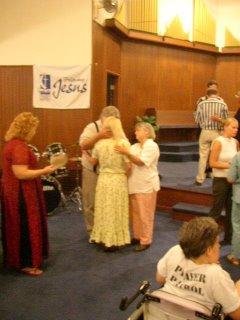"Holy Spirit religion" is quietly infiltrating the church, revitalizing us all.
by Chris Armstrong posted 09/19/2006 09:30 a.m.
I recently attended a Midwestern Baptist church in which the pastor directed his congregation to pray with hands extended toward a "pray-ee"—a man standing at the front. Since I'd worshiped in a Pentecostal church for ten years after my conversion as a young adult, I immediately recognized the gesture as a mark of Pentecostal spirituality. Indeed, I discovered later that the Baptist pastor had once been a Pentecostal pastor.
 Two thoughts sprang to mind that Sunday morning. First, I realized there are dozens of visible clues associated with Pentecostal churches. People fall "under the power." Congregants stand to prophesy, speak in tongues, or interpret. Arms are raised during prayer and worship. People dance in the Spirit. Pentecostalism is nothing if not physical and active.
Two thoughts sprang to mind that Sunday morning. First, I realized there are dozens of visible clues associated with Pentecostal churches. People fall "under the power." Congregants stand to prophesy, speak in tongues, or interpret. Arms are raised during prayer and worship. People dance in the Spirit. Pentecostalism is nothing if not physical and active.
Second, while most of these practices remain confined to Pentecostal churches, many non-Pentecostal (and non-charismatic) congregations have become "Pentecostalized" in other ways. Contemporary worship style is an oft-noted influence of Pentecostalism, with congregations of all stripes now singing choruses and praise music, even raising their hands in adoration. But "Holy Spirit religion" is leaving its deepest mark in less visible, more significant ways.
A Spirit of Spontaneity
A typical Pentecostal service follows no printed order; bulletins, if present, contain only announcements. After all, why should an order be needed? "All the members expect anyone of the local assembly to follow the Spirit's leading," Pentecostal scholar Russell Spittler has written, "and to do so at once."
This sort of congregational freedom has marked Pentecostalism from its beginning, along with a unique emphasis on the "priesthood of all believers." Azusa Street pastor William J. Seymour, the driving force behind the earliest Pentecostal revival, typified a new breed of church leader. He allowed and encouraged worshipers to exercise their gifts during services, providing what Fuller professor Cecil M. Robeck has called "a forum for various members of his congregation to make their case or to demonstrate their charism in the context of the worshiping community, without fear of recrimination." When someone moved beyond the bounds of accepted order, Seymour corrected him or her in a manner that, while firm, was also "gracious and soft-spoken."
to read the article in its entirety click on the title above 
No comments:
Post a Comment